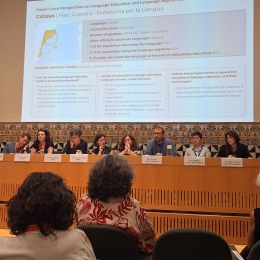Plataforma per la Llengua took part this Saturday, June 15th, in the international conference "Protecting Education in Minoritised Languages, Strengthening Language Rights: How to Progress?", organised by the European Linguistic Equality Network (ELEN) and Catesco in Barcelona. Marc Guevara, head of Education and Universities at the organisation, spoke to denounce the Spanish state's use of the judiciary to undermine the Catalan language school model in Catalonia and to question the fact that the territory's own language is used as a vehicular language.
Guevara's intervention was part of a roundtable discussion on the achievements and challenges of different education models in minoritised languages in Europe and the guarantee of speakers' rights in various legal and public policy frameworks. Guevara spoke of the judicial offensive against schools in Catalan, "a strategy orchestrated by the Spanish state" which, since it began in 2010 with the ruling of the Constitutional Court, "has been gaining ground" and which "successive Catalan governments have been unable to stand up to".
The representative of Plataforma per la Llengua pointed out that the rulings are based on a political bias against the normalisation of Catalan, and analysed why they are highly questionable from a legal point of view. Moreover, Guevara believes that the sentences will do nothing to improve students' knowledge of Catalan, which "continues to fall, according to PISA and the reports of the Catalan High Council for the Evaluation of the Education System". The level continues to drop and so does the use of the language, both in the classroom and in the playground. "There is a lack of resources of all kinds, especially concerning newly arrived students, and it is essential to train teachers in language, linguistic habits, and sociolinguistics so that they understand what linguistic immersion is and how to apply it. So far this has not happened," he denounced.
Guevara's round table was also attended by Catalina Bibiloni, from Obra Cultural Balear; Núria Betoret Olives, from Acció Cultural del País Valencià, and representatives of Irish, Frisian, Breton, Galician and Basque speakers. Specifically, Ciarán Mac Giolla Bhéin, from Glór na Móna; Mirjam Vellinga, from Afûk; Anna-Vari Chapalain, from Kevre Breizh-Diwan; Elsa Quintas Alborés, from A Mesa pola Normalización Lingüística, and Idurre Eskisabel, from Euskalgintzaren Kontseilua. The table was moderated by Elin Haf Gruffydd Jones, President of ELEN and Professor of Sociolinguistics at the University of Wales Trinity Saint David.
A high-level meeting with representatives of the UN and the Council of Europe
The event, which took place at the Institut d'Estudis Catalans on Saturday between 9 a.m. and 5:30 p.m., was a high-level meeting to analyse the role of civil society organisations in protecting the rights of minoritised language speakers. It was attended by representatives of the UN system, including the current UN Special Rapporteur on Minority Issues, Nicolas Levrat, and his predecessor, Fernand de Varennes. Personalities associated with the Council of Europe were also present: Lusine Kharatyan, member of the Committee of Experts of the European Charter for Regional or Minority Languages (CELRoM), and Petra Roter, President of the Advisory Committee of the Framework Convention for the Protection of National Minorities.
Other legal and academic experts included Janos Fiala from the University of Galway in Ireland, Eva Pons from the University of Barcelona, and lawyer Benet Salellas. Fiala discussed strategic litigation in the European Court of Human Rights (ECtHR) and UN courts, and international advocacy for language rights. Pons spoke of the need to legally ensure full knowledge of the official languages as a mechanism for cohesion and a guarantee of equality. In addition, Salellas spoke of the legitimate aims and objectives set out by the ECtHR and the case law of the CJEU on minoritised languages.
Also in attendance were Davyth Hicks, Secretary-General of ELEN; David Minoves, President of CIEMEN; Xavier Antich, President of Òmnium Cultural; Marina Gay, Director of Catesco; Maria Corominas, from the Institut d'Estudis Catalans and member of Catesco; Tamara Martí, from UNESCO's Section of Education for Inclusion and Gender Equality; Adam Majó, Director General for the Promotion and Defence of Human Rights of the Generalitat of Catalonia, and Francesc Xavier Vila, Secretary for Linguistic Policy of the Generalitat of Catalonia.
Plataforma per la Lengua is part of ELEN's steering committee
The Organisation for the Defence of the Catalan Language is a member of the board of the European Language Equality Network and since 2016 has held the vice-presidency under Marga Payola, International Coordinator of Plataforma per la Lengua. ELEN is an umbrella organisation of seventy organisations from all over Europe working to defend and promote linguistic diversity in European territories.





